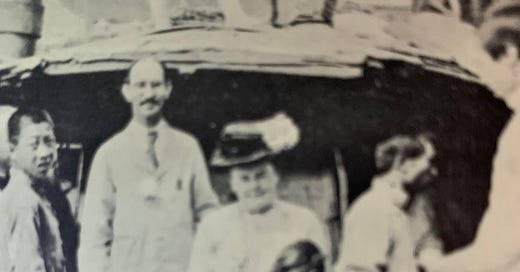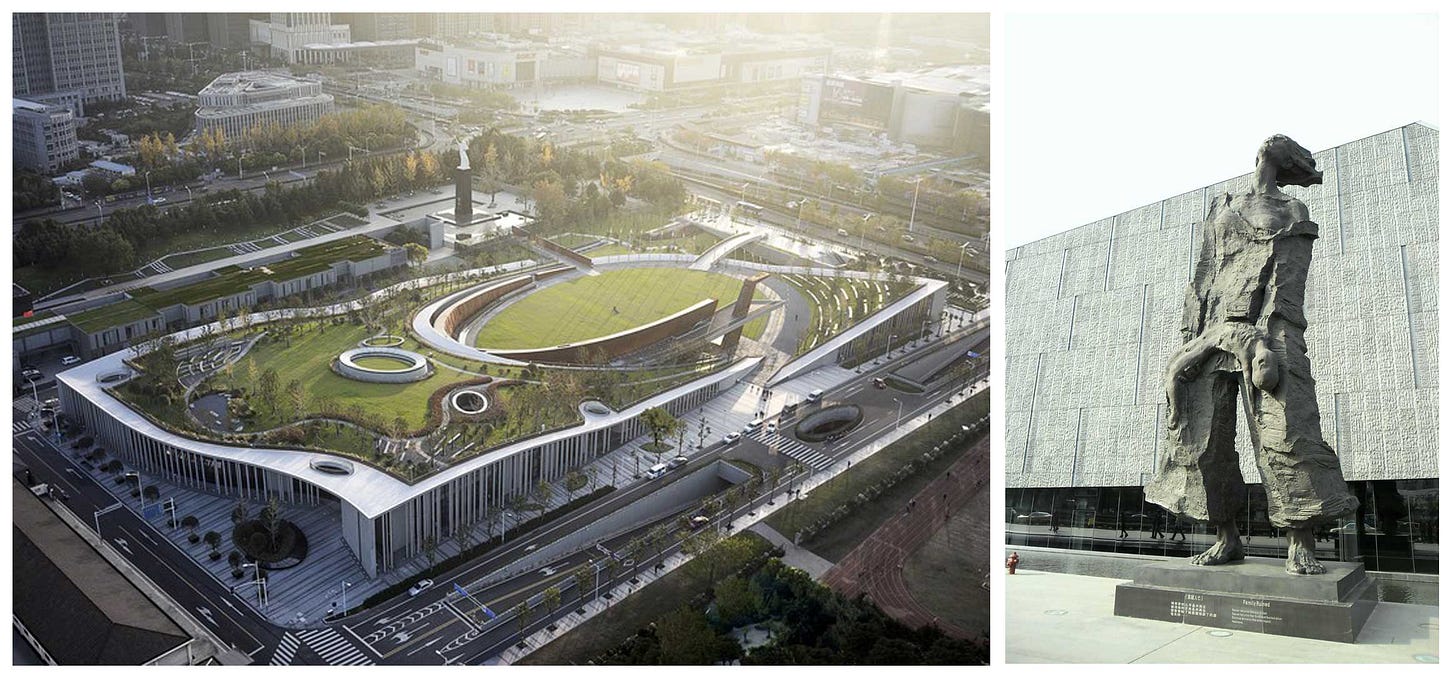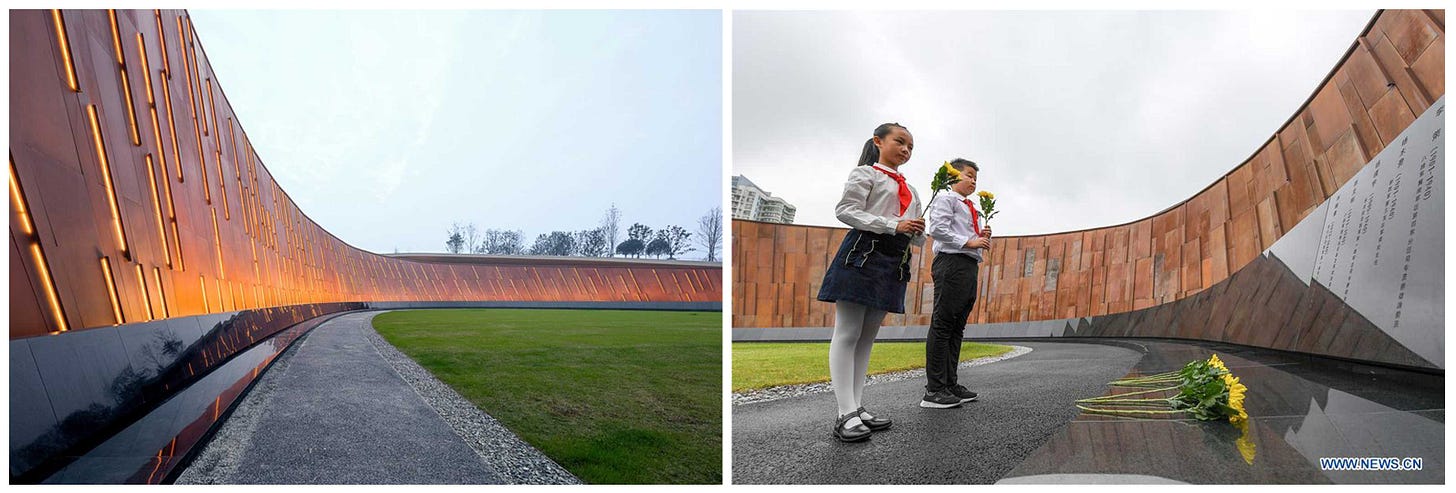THE LAST LETTER FROM ‘YANGCHOW’ – LETTER III - A Poignant Perspective of War By Stephen W Green written from Shanghai in 1938
Smitten By Faith Issue # 00050 November 5th 2022
In Issue # 00048 dated October 8th 2022, you read the remarkable story of how, 85 years since the ‘Letters From Yangchow’ (3 letters in total) were written ( in 1937 and 1938 ) by an American Missionary, Stephen W Green ( ‘W’) , they came into the hands of his son, Stephen H Green and then, how the letters were passed on to me in Tokyo in 1984. In the first 2 letters, the reader is able to obtain a first-hand experience from W and his family of how the missionaries in China lived through the beginning of the Sino-Japanese War from 1937-1945. Although the Japanese and Chinese had been involved in military conflicts since the first Sino-Japanese War from 1894 to 1895, this second war which directly affected the Green family was cause for some alarm. In the beginning, no one was particularly very worried about any escalation of the war although daily life was far from peaceful with travel restrictions and constant air raids, and military clashes here and there. Still, with his family, W stayed on resolutely as headmaster of his school among the Chinese whom he loved. Missionary families were made of sterner stuff !
Above : I am repeating here a faded photograph of W and his wife Ellen which I had earlier published in the First Letter from Yangchow. I wish I had more photographs of the family.
The second letter from W which I published in Issue # 00049 on 15th October, captured vividly and dramatically the early days of the Second Sino-Japanese War. He writes about how he and his family lived through air raids, attacks, food and other deprivations and dangerous travel within China. Japanese soldiers were now everywhere. Chinese cities were being attacked. Chinese refugees were also sadly becoming a common sight. What were the missionaries to do? In the case of W, as headmaster of the Mahan School in Yangchow, his school was still open even if only barely! So, in spite of the continuing and worsening chaos, the brave W and his family remained in China.
However, as history tells us and as we all now know, things were about to get worse and dire in China. And we can feel this in the very last letter written from Shanghai by W dated January 24th 1938 which is very poignant and emotional. At this time, the Green family were stuck in Shanghai since they could no longer return safely to Yangchow which was occupied by the Japanese. In Shanghai, W was given the use of a house by a friend and his letterhead says, ‘Jessfield Road, Shanghai’. The letter is typed with many typing mistakes, some of which I have corrected and some I left. There are a few grammatical errors, some of which I have also retained to show W’s urgency and emotion. Remember too that this was the time of the old clunky manual typewriter ( when corrections could not be easily made ). W typed his letters using carbon papers to make his copies which he then sent to his American family and friends who then passed the letters onwards to other family and friends – in a daisy chain halfway across the world. As W himself, said : “ ….this is a lazy way of writing and unworthy of all the affection you have shown, but please forgive me this time. It has not been easy to make these carbons even. “
By January 24th 1938 when W wrote this third and last letter ( Letter III ), it was already clear to him that things were getting very grim in China – now deep into the Second Sino-Japanese War. What must have obviously cast a deep shadow over this last letter was ‘The Nanjing Massacre’ also called ‘Rape of Nanjing’ which happened between December 1937 and January 1938, the horrific mass killing of between 200,000 to 300,000 civilians and captured soldiers and the rape and ravaging of more than 80,000 Chinese women by the Japanese Imperial Army after its seizure of Nanjing on December 13, 1937.
You will see in his letter below that W does not specifically mention the horrific incident or even the name, ‘The Nanjing Massacre’. Could it be that he did not know what happened then ? After all, the terrible atrocity committed in Nanjing by the Japanese was on December 13th 1937 and W’s letter was dated January 24th 1938, just a month apart. However, Nanjing located also on the Yangtze river was not far at all from Shanghai and it’s doubtful that people in Shanghai would not have known. I kept reading and re-reading W’s last letter many times and I think that actually W must have known about the Nanjing Massacre but he just could not bring himself to write about it to his relatives cocooned so far away in America where such horrors were impossible to even imagine. Why do I say this ? In the first paragraph of W’s letter below, he writes, “ ….you will have read some of the things which have been happening recently. I do not mean the bombings and machine gunning of civilians – those are old stories which everyone read about long ago, but of things which happened since the war passed beyond this.” And later “ ….but you will be reading of the whole-sale ness and shamelessness of those on one side very soon. ( Editor’s note : bold added for emphasis). In fact, W writes that he had torn up some of the earlier pages of his letter because “ ….Some of the things which I wrote in those two pages were pretty awful – no more so than the actual facts, but for other reasons than to spare your sensibilities I have decided to tear up those pages.”
Then, why did W not speak out more forcefully ? Why did he write that “ ….there are atrocities committed by both sides.” We can also see that W is furious - boiling mad – with the world - that the world is not paying attention to the war happening in China and how it has impacted its people. You will be able to gather from reading the more frantic emotional way he writes this last letter that W was now highly disturbed and saddened by the situation in China and the growing threat of a World War beyond China. As I mentioned, I have left most of W’s language as is in order to communicate better his state of mind – a missionary’s perspective of war and peace – not just of grief at the senselessness of all conflicts and the atrocities committed but also a deep sense of compassion as he tries to acknowledge that war engulfs all sides and that not all Japanese were wicked people. W was at all times, a man of peace.
Left : The Memorial Hall to the Victims of the Nanjing Massacre in Nanjing. Although the name, ‘Nanjing Massacre’ is not specifically mentioned in W’s last letter, I feel that it is appropriate to show here the beautiful Memorial Hall of the Victims in Nanjing Massacre in Nanjing ( opened in 1985). It’s a sad poignant reminder of the barbarism of war and that we must strive for peace. I think that W who always advocated love and peace would have approved.
Right : This sculpture is one of the many dramatic poignant sculptures that dot this huge park to remember those who died in the Sino-Japanese War and also World War 2.
Above : Lest we forget - another perspective of the tranquil Memorial Park in Nanjing
I shall let W’s last letter below speak for itself. For paid subscribers, I will be sending you later, a bitly link with which you can download ALL the 3 unedited letters and also the Epilogue. I would also like to end my description of the 3 ‘Letters From Yangchow’ with an acknowledgement of my dear friend, Stephen H Green, the son of W, whom I got to know well and fondly in the 10 years I was working in Tokyo. I hope that I have managed to do justice to the memory and legacy of Stephen, his incredible father W, his family and all the brave missionaries who gave so much of their lives to China.
THE LAST ‘LETTER FROM YANGCHOW’ BY STEPHEN W GREEN
Shanghai January 24th 1938
99D, Jessfield Road, Shanghai, China
January 24, 1938
By the time this reaches you, you will have read of some of the things which have been happening recently. I do not mean the bombings and machine gunning of civilians – those are old stories which everyone read about long ago, but of things which have happened since the war passed beyond this region. During what used to be called the “World War” – if something is not done soon about stopping this war out here and the suspicion, jealousy, and hatred in Europe which now exists, there will be a real “World War” which will make the other seem like children’s bickering. There was much propaganda on both sides. They told of atrocities on both sides. There were atrocities, but many, many of the tales were grossly exaggerated or false. It is hard now to get people to believe in the accuracy of newspaper tales of such things. In the most “civilized” (God forgive the use of this word in describing any war) wars there are atrocities, but by individuals or small groups.
In this war out here, there are atrocities committed by both sides, but you will be reading of the whole-sale ness and shamelessness of those on one side very soon. As I said, I am not going to describe any of them, but I will say that I have seen or have heard first hand evidence as to the truth of many of them myself or from Chinese and foreign eyewitnesses ….. I hope that this sort of thing will cease now that there is publicity out here and as protests come in from Europe and America and the high authorities of the Japanese army get control of those below them, but an interview with the highest military authority of the Japanese in China, given to a Japanese magazine and published in today’s Shanghai English – language newspapers, seems to show that even General Matsui approves of what his army is doing.
I myself have not seen anything except the machine – gunning of civilian refugees as yet. I hope, within the next few days to get a pass from the Japanese military authorities to go up to Yangchow. The foreigner who did not come out before the Japanese took the city stayed there to help five or six hundred refugee men, women, and children. The letters say that the Japanese have treated the refugees very humanely and even kindly. Many of our friends have gone from Yangchow into the country up the Canal, and if I cannot get a pass to go to the city itself in the hopes of helping people who were too poor to get out, I shall probably go up behind the Chinese lines …….to get money to people who have fled there and to give them encouragement. ………Also, thru former students of mine now in the Standard Oil, I can send drafts through Standard Oil agents in some of the towns, giving the head offices here in Shanghai local cheques for the drafts. Really the only use of my going would be to encourage fellow teachers and friends, and to cheer them up.
The Chinese are by no means discouraged, but the contrary. Yesterday we had eight or ten Mahan School alumni in to tea – some who live in Shanghai and some who are refugeeing here. One of the refugees, Chen Chiao-feng …. stayed with us for three or four days after he came out of the hospital. One day I was passing by one of the wards at St. Luke’s and suddenly heard my name called. I looked in and there was Chen Chiao-feng. He had been brought in the night before with a piece of Shrapnel in his ankle…..[ On his boat], he got his wound when he was trying to help a wounded comrade from the first air-raid to get into the reeds when the planes came for the second raid. He has given one bright picture amidst all the horrors. Of course, he went through the latter, but he did praise the kindness of the Japanese doctor who was finally sent to look after the wounded when the bombing became known to the world. He also told of a Japanese soldier who came up to him when they were first ashore near Wuhu and were not being treated so well. This soldier took him by the hand and whispered : “I’m tired of this war” but ran away when comrades came near. Certainly not all the Japanese are keen on the war.
In fact it is the opinion of some that even those high in authority are rather in a bad position now because, victory after victory having been reported for months in Japan and no defeats, the people are beginning to ask: “Why doesn’t my son, or my husband, or my father come home, or write to me?” “If we have won so much territory so easily and the Chinese can’t put up any more resistance, in fact, if the government of China has now been changed to a government friendly to us and eager to cooperate in reconstruction now that there is peace in so many places, why are all these new taxes necessary, and these new loans, and this further economy and self-denial, and self-sacrifice?” Friends from Japan arriving here from time to time after being marooned there for some months tell me that although no one would speak in the presence of another Japanese, many, many, Japanese came to them privately and told of how they did not want the war, did not want to fight, but were powerless in the hands of their military. ….. Of course many would say that I am as prejudiced as was the League of Nations when it condemned Japan as the aggressor, but did you read the speech of Konoye, the son of Prince Konoye, the Premier of Japan, in which young Prince Konoye, a student at Princeton, admitted that Japan was not altogether justified in her attack on China?
These three pages have had less of the personal in them. I hope they have had more of interest than the other pages, or at least as much. Perhaps you wouldn’t mind a little recent personal news.
We left the American School on January 1 for a private residence in Shanghai belonging to an alumnus’ relative. It is fine in one way, for it is a beautiful house with good furniture, a nice yard, a swimming pool – not used in this icy weather – and the use of a car to take the children to school over in Frenchtown. But it is expensive to keep up …..our reserves are going, not to speak of no savings. But we shall probably move soon to a smaller house, and may be able to get our own servants from the country and thus save double wages (We couldn’t cast our Yangchow servants off at such a time as this, especially when some of them risked their lives to protect our property ….. Mahan is occupied now by Japanese soldiers and all servants turned off the place by them. It may be that Ellen will not have to have an operation after all. Benny & Stephen had flu, but are fine shape now.
Our love to all.
Ellen, Stephen, Benny, Steve.
________________________________________________________________________
Editor’s Note :
Dear Reader, thank you for reading this edition of SMITTEN BY FAITH.
ALL articles in every issue are FREE.
For those of you who upgraded to be a PAID Subscribers for US$ 60.00 a year, thank you so much ! All proceeds go to the Regina Apostolorum Foundation to promote Catholic higher education.
PAID Subscribers will also receive via Bitly link ( see the posts pinned above available only to paid subscribers ) the digital copy of the recent book by Joan Foo Mahony, ‘LATE HAVE I LOVED THEE’ and THE COLLECTED ARTICLES, VOLUME ONE 2021 and the recent VOLUME TWO 2022 of Smitten By Faith, a DIGITAL COMPILATION of all the previous year’s 2021 and six months of this year’s 2022 articles.
Paid Subscribers will also soon receive the Bitly link to full contents of ALL the Letters From Yangchow : Letters I to III.
For paid subscribers, simply click on the relevant Bitly links to receive the publications.
Paid Subscribers will also receive additional exclusive material from time to time.






